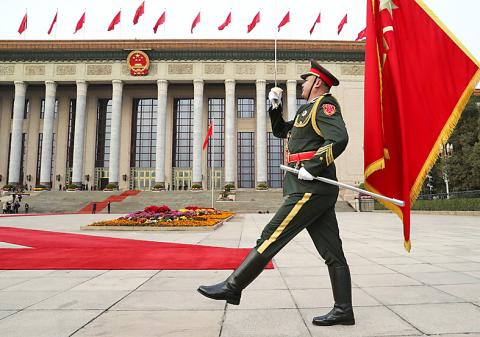The Pentagon on Tuesday released a report that lays out US concerns about China’s growing military might, underscoring worries about a possible attack on Taiwan.
The key concern is that as China upgrades its military equipment and technology, and reforms how it trains and develops troops, it becomes more confident in its ability to wage a regional conflict, a senior US defense intelligence official told reporters.
Beijing has made it clear that asserting sovereignty over Taiwan is its top priority, they said.

Photo: AP
Although China could easily fire missiles at Taiwan, it does not yet have the military capability to successfully invade, the official added.
They spoke on condition of anonymity to provide more detail on intelligence findings in the report, which was written by the US Defense Intelligence Agency.
Its release came a week after Chinese President Xi Jinping (習近平) called on the Chinese People’s Liberation Army (PLA) to better prepare for combat.
The report talks broadly about the steps China is taking to modernize its military and expand its operations around the globe.
The worry is that China would reach the point where leaders would decide that using military force for a regional conflict is more imminent, the official said.
“Beijing’s long-standing interest to eventually compel Taiwan’s reunification with the mainland and deter any attempt by Taiwan to declare independence has served as the primary driver for China’s military modernization,” the report says. “Beijing’s anticipation that foreign forces would intervene in a Taiwan scenario led the PLA to develop a range of systems to deter and deny foreign regional force projection.”
The PLA is “likely to grow even more technologically advanced, with equipment comparable to that of other modern militaries,” it said.
The US official said that China has been working hard on developing ways to combine cyberattacking capabilities with kinetic weapons.
However, Beijing would face a significant challenge as it tries to bring generational change to its military, they added.
China has mainly done tightly controlled regional operations and some counterpiracy missions, but it would be more difficult to create a joint force capable of conducting large, complex combat operations far abroad, the official said.
Ministry of National Defense Major General Chen Chung-chi (陳中吉) said that Taiwan watches the development of Chinese military capabilities more closely than any other nation.
“However warfare could play out, that is how we train,” Chen said on the sidelines of a simulated drill at the Hsinchu Air Base to reinforce the military’s defense capabilities ahead of the Lunar New Year holiday.
Additional reporting by Aaron Tu

‘TAIWAN-FRIENDLY’: The last time the Web site fact sheet removed the lines on the US not supporting Taiwanese independence was during the Biden administration in 2022 The US Department of State has removed a statement on its Web site that it does not support Taiwanese independence, among changes that the Taiwanese government praised yesterday as supporting Taiwan. The Taiwan-US relations fact sheet, produced by the department’s Bureau of East Asian and Pacific Affairs, previously stated that the US opposes “any unilateral changes to the status quo from either side; we do not support Taiwan independence; and we expect cross-strait differences to be resolved by peaceful means.” In the updated version published on Thursday, the line stating that the US does not support Taiwanese independence had been removed. The updated

‘CORRECT IDENTIFICATION’: Beginning in May, Taiwanese married to Japanese can register their home country as Taiwan in their spouse’s family record, ‘Nikkei Asia’ said The government yesterday thanked Japan for revising rules that would allow Taiwanese nationals married to Japanese citizens to list their home country as “Taiwan” in the official family record database. At present, Taiwanese have to select “China.” Minister of Foreign Affairs Lin Chia-lung (林佳龍) said the new rule, set to be implemented in May, would now “correctly” identify Taiwanese in Japan and help protect their rights, the Ministry of Foreign Affairs said in a statement. The statement was released after Nikkei Asia reported the new policy earlier yesterday. The name and nationality of a non-Japanese person marrying a Japanese national is added to the

AT RISK: The council reiterated that people should seriously consider the necessity of visiting China, after Beijing passed 22 guidelines to punish ‘die-hard’ separatists The Mainland Affairs Council (MAC) has since Jan. 1 last year received 65 petitions regarding Taiwanese who were interrogated or detained in China, MAC Minister Chiu Chui-cheng (邱垂正) said yesterday. Fifty-two either went missing or had their personal freedoms restricted, with some put in criminal detention, while 13 were interrogated and temporarily detained, he said in a radio interview. On June 21 last year, China announced 22 guidelines to punish “die-hard Taiwanese independence separatists,” allowing Chinese courts to try people in absentia. The guidelines are uncivilized and inhumane, allowing Beijing to seize assets and issue the death penalty, with no regard for potential

There is no need for one country to control the semiconductor industry, which is complex and needs a division of labor, Taiwan’s top technology official said yesterday after US President Donald Trump criticized the nation’s chip dominance. Trump repeated claims on Thursday that Taiwan had taken the industry and he wanted it back in the US, saying he aimed to restore US chip manufacturing. National Science and Technology Council Minister Wu Cheng-wen (吳誠文) did not name Trump in a Facebook post, but referred to President William Lai’s (賴清德) comments on Friday that Taiwan would be a reliable partner in the